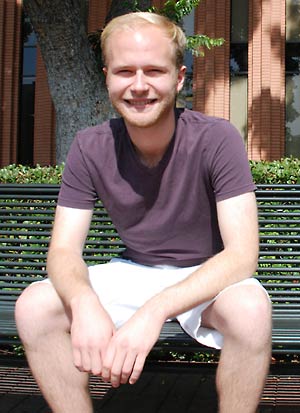
Gregory Irwin
Undergraduate Intern at the Institute
Gregory Irwin ’14, an international relations major with a minor in screenwriting, has been an intern at USC Shoah Foundation since his sophomore year. He was inspired to get involved by the stories his grandmothers have told him about their experiences during the Holocaust.
Over the past year and a half, Irwin has had the chance to work on a variety of different projects at USC Shoah Foundation. His first task was helping select the short clips of testimony from the Visual History Archive that would be used in activities for IWitness, USC Shoah Foundation’s educational website that allows students to create multimedia projects and complete activities using testimony. Currently, he is researching patterns or trends that can be found in the messages for future generations that Rwandan interviewees, like Holocaust interviewees, are asked to give in their testimonies.
Irwin says his favorite memory of working with USC Shoah Foundation is the two-week trip to Rwanda he took this summer for USC Dornsife’s School of International Relations’ Problems Without Passports course “Rebuilding Rwanda: Memory, Testimony and Living Together After Genocide,” taught in part by USC Shoah Foundation’s Dan Leshem, associate director of research, and Amy Carnes, associate director of education, evaluation and scholarship. Following two weeks of intensive coursework using the Visual History Archive, students traveled to Rwanda to tour genocide memorial sites and researched different aspects of post-genocide reconstruction.
“It was pretty incredible. We got to meet all these remarkable people – high level people in government, ambassadors, survivors – hearing stories and connecting with this tragic event that I had little background in,” Irwin says. “I came in to USC Shoah Foundation with a Holocaust background, which I could automatically connect to, but now I feel as closely affected or more so by the memory of Rwanda. It was very impactful.”
Although he intends to pursue a career in screenwriting, Irwin says his work at USC Shoah Foundation has been very important to him. Its Visual History Archive, which contains nearly 52,000 testimonies of survivors and other witnesses of the Holocaust and other genocides, is a living historical document that can preserve information about history that might otherwise be lost, he says.
“You have information that just leaks through over time. It just passes away. But here 52,000 stories are preserved and that’s absolutely spectacular,” he says. “If I can have some small part in getting a few of those stories heard that’s worth an enormous amount to me.”